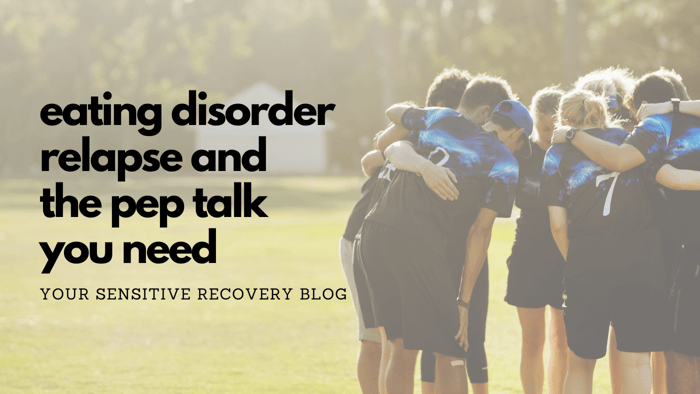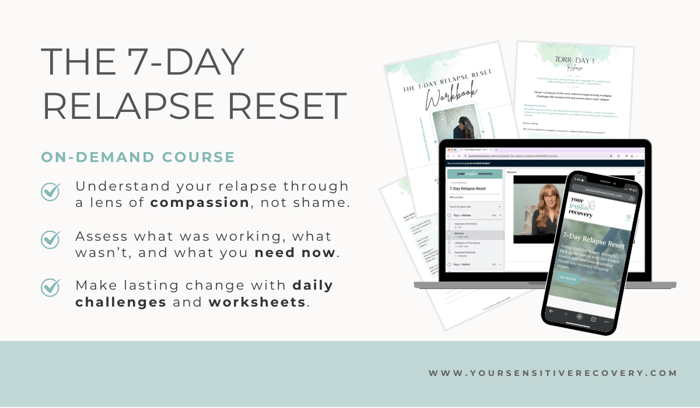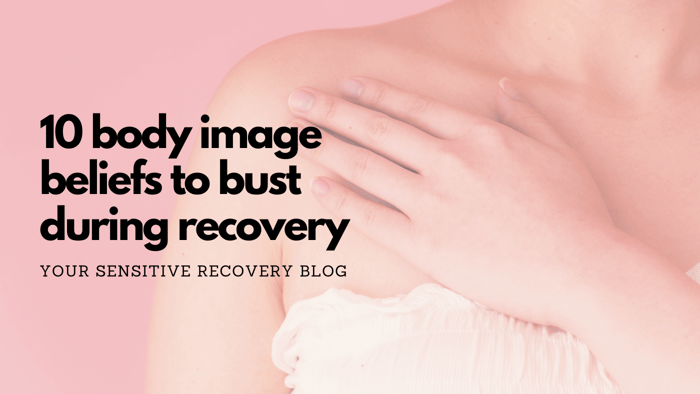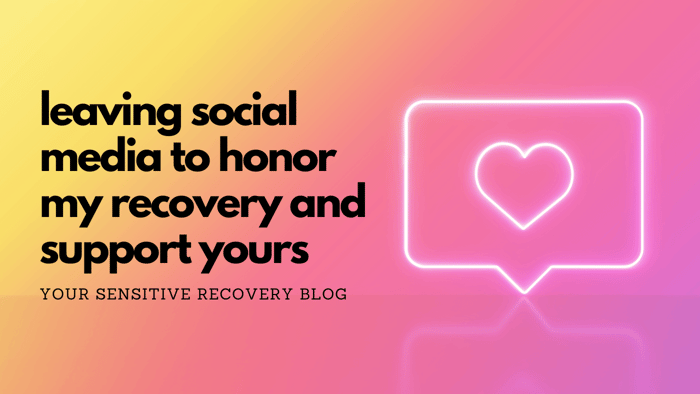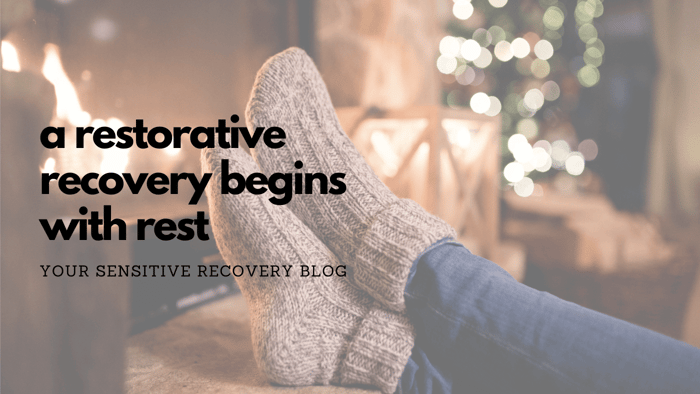When facing an eating disorder relapse, it's easy to get swept away in a stormy sea of negativity by self-disparaging thoughts like, "I'm not good enough" or "I don't deserve recovery" or "I'll never get better." Relapse, though frightening and disheartening, is a common, understandable, and sometimes necessary and important part of the recovery process. But man is it rough!
I know that sea of negativity all too well. As a therapist who has been through eating disorder relapse and has helped many others through their own, I'm here to share the truth about what relapse is, some self-exploration prompts to understand your risk, and the no-nonsense pep talk you need to navigate your way back to shore.
Knowledge is Power: Understanding Relapse
First things first: relapse is not a singular event. It's actually a string of smaller slips or lapses. These missteps are not just typical behavioral ones you might commonly think of, like a missed meal, a binge, or an episode of compulsive exercise. They also include events and experiences like shifts in your thinking, lies and dishonesty, skipping an appointment, choosing not to reach out, placing yourself in unnecessary, high-risk situations, etc. When these slips and lapses start to pile up, you've got a relapse in the works.
It's a painful experience that can leave you feeling defeated, frustrated, and uncertain about the path forward...on one hand. But, on the other hand (your eating disorder's hand), it might not actually feel that bad, and that's how you know that you're in dangerous territory.
📝 Self-Exploration Prompt |
Slips and lapses are more likely to occur around red-flag situations. These situations increase disordered thoughts and urges to use behaviors. Your red flags might be certain people, places, events, things, time periods, or emotional states. Think about going to a party, being on vacation, catching a cold, having too many late nights, feeling lonely, etc.
📝 Self-Exploration Prompt |
A Hard Pill to Swallow
There are a lot of reasons why it can be difficult to admit a relapse and get help for one. To someone who has never experienced an eating disorder or an addiction, this might not make a lot of sense. They might be thinking, "Why would you CHOOSE to keep suffering this way?"
Of course, it's not so simple, and it certainly isn't black and white. Eating disorders serve very real purposes, and the purposes served go far beyond the typical "need for control" shpiel. To add to that, secondary gains begin to develop.
Secondary gains are the indirect benefits or advantages you may unconsciously experience as an eating disorder strengthens.These gains are not intentional, and they're separate from the primary purposes the eating disorder served. Secondary gains can make it harder to choose recovery, even when the majority of you genuinely wants it. Here are some examples of secondary gains that can keep you stuck:
- a sense of accomplishment or achievement
- receiving attention, care, or even praise from others due to behaviors
- a way to get out of responsibilities or social pressures by being too sick to participate
- feeling less overwhelmed in life by narrowing your life to a numbers game
- a sense of identity, differentness, or specialness from the disorder
I know that it can be very uncomfortable to start acknowledging secondary gains, but bringing them out from your unconscious and into the light is extremely important.
📝 Self-Exploration Prompt |
You know that saying, "When you know better, you do better?" I like to think of it this way when it comes to recovering from an eating disorder: When you know better, you try to do better, and when you struggle to do better, it usually means there's a lack of support, a lack of a needed skill, or secondary gains at play.
That's not your fault, but it is your responsibility to get real about the situation and seek the help you need to build that support, learn that skill, and/or deal with the secondary gain(s). When you allow self-criticism and self-shaming thoughts to run amok, unchecked, you give your eating disorder permission to thrive.
Relapse is not the time to spiral into self-pity. It's the time to meet yourself with honesty and firmness, as well as compassionate understanding.Think: The Coach Approach. The best coaches push you (yet respect your ultimate limits), are boundaries (yet understand the need for flexibility), and care deeply (yet don't let you get away with bullshit). Be your own best coach.
Righting the Ship
If you find yourself in the midst of a relapse or starting to slide down that slippery slope, I want you to know that you're not alone and there is ABSOLUTELY hope for course correction. Here are some strategies to help you navigate your way back to solid ground:
- Watch the Dramatic Thoughts: Practice viewing a lapse for what it is: important, difficult, and temporary. It's not a harbinger of irreversible doom. When you challenge overly dramatic thoughts about it being the end of the world ("F*ck it, I might as well give up."), you're better prepared to respond positively and successfully.
- Talk About It: Reach out to your support system. Tell somebody - a therapist, a trusted loved one, an online support group - SOMEBODY. This makes it real and solidifies the severity of the situation in a necessary way.
- Be Compassionate With Yourself: Relapse is a difficult, emotional experience. Remind yourself that this is not about failing or giving up. Compassion doesn't mean pity or permission to wallow, so don't let the negative self-talk to get the best of you. You DO have some control here.
- Celebrate Small Victories: As you work to get back on track, be sure to celebrate the small victories along the way. Every little step matters. Whether it's reaching out for help, practicing a new coping skill, or simply getting through another day, acknowledge and honor your progress.
- Seek Additional Support: If you're struggling to regain your footing, don't hesitate to seek additional support. This might mean working upping sessions with your team, joining a support group, or exploring a more comprehensive and supportive level of treatment.
The Silver Lining of Lapses
You are a human going through a natural and difficult part of your journey. It's important to acknowledge ALL of your feelings without judgment, from disappointment to relief, and from fear to hope.
Both lapses and relapses are valuable teachers that will strengthen your recovery if you let them by showing you what you need to pay more attention to in order to heal.Stay curious, honest, and open on this journey. Relapse is a testament to the strength and resilience it takes to recover. You don't need to expect or hope for a relapse, by any means...but if you find yourself there, you can embrace the opportunity to rise up and face it. Remember, countless individuals have walked this path before you, and are cheering you on. You can do this. 🎉
✨ Josie Munroe, LMFT is a licensed therapist and owner of JosieMunroe.com and Your Sensitive Recovery. As a recovered clinician and Highly Sensitive Person, she loves supporting others on their journeys to form new, empowered relationships with food, their bodies, and their sensitivity. Join the newsletter for a weekly boost of hope and inspiration. You deserve a recovery that works for you! ✨

